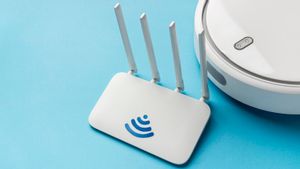JAKARTA – Skipping lunch for various reasons, turns out to have a significant effect on the brain and body. Since you have breakfast 6 hours later, your body needs nutrients to keep your metabolism working. What are the risks if you eat late?
It doesn't really pose a big problem if you do it every once in a while. But if you frequently skip meals or eat late, experts are gathering evidence about the long-term effects. As reported by Self, Friday, November 19, eating late in the short term science has proven its effects on the body.
According to Brigitte Zeitlin, MPH, RD, CDN, founder of New York-based BZ Nutrition, eating regularly or skipping meals keeps you alert, focused, and prevents a drop in energy.
When you eat late, what happens first is your blood sugar and energy levels, perhaps your body. Zeitlin explained, food is fuel and recommends filling the body with something every few hours so that the fuel in the body is not scarce.
"The main fuel for your brain is glucose, which you get from eating foods, especially those rich in carbohydrates," explains Rachele Pojednic, Ph.D., assistant professor in the Department of Nutrition, Simmons College and professor at Harvard Extension School.
Pojednic recommends consuming complex carbohydrates from fruits, vegetables, and whole grains. Complex carbohydrates are great for energy because the fiber they contain helps keep blood sugar levels stable.
Well, if you eat late, the body can run out of glucose supply immediately. Low blood sugar can drain your energy and leave you feeling lethargic and weak. Zeitlin adds it can also make it difficult for you to concentrate because your brain doesn't have the fuel it needs to think clearly.
SEE ALSO:
The effect that follows late eating is not considering healthy foods to eat. Lauren Harris-Pincus, MS, RDN, explains that the hormone ghrelin stimulates appetite and leptin suppresses appetite. Both will send information that you are hungry but because the brain is not thinking clearly because fuel is scarce it becomes difficult to think about anything other than eating. Including not having time to think about which foods are healthy for consumption.
"When people are very hungry, they tend to go for carbs and sweets because that will raise their blood sugar," says Harris-Pincus.
This will probably make you feel better quickly. The problem is that the urge can be temporary if you only eat carbohydrates. Without the fat, protein, and fiber to cushion the rise in glucose, blood sugar can spike and then drop again. It will not be good for your health.
Zeitlin adds, when you wait to eat until you are really hungry, it will be easy to eat past the point of fullness. Finally feeling full, sleepy, and your stomach feels uncomfortable.
“You tend to overeat to make up for the lack of calories consumed throughout the day. That can lead to nausea, constipation, bloating, and fatigue," explains Zeitlin.
Skipping meals in addition to the above risks also affects other general effects. Like if the frequency of stomach acid rises, catches a cold, or decreases overall health levels. That is, skipping meals is not a smart idea even though you have a busy day.
The English, Chinese, Japanese, Arabic, and French versions are automatically generated by the AI. So there may still be inaccuracies in translating, please always see Indonesian as our main language. (system supported by DigitalSiber.id)















